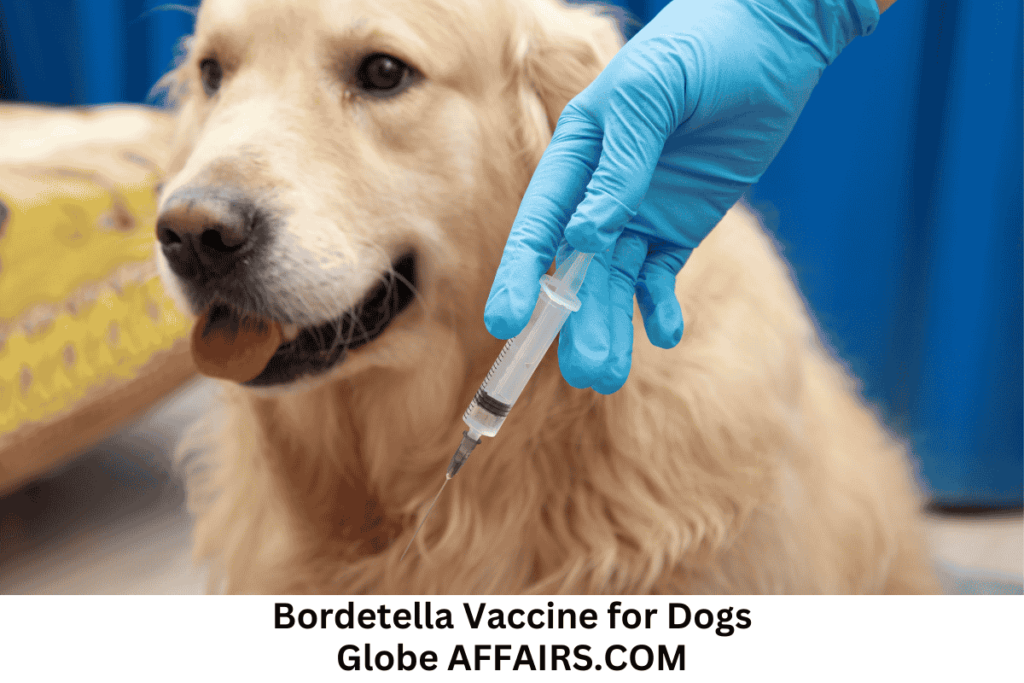If you’ve ever entered a grooming facility, stepped into a busy doggy park, or been to pet daycares, it would be be normal that you should have heard pet owners talking about what is Bordetella vaccine for dogs. A necessary vaccine since kennel cough (also known as canine infectious tracheobronchitis) is most often caused by the bacteria Bordetella bronchiseptica, which is a highly contagious and can lead to upper respiratory tract infection. The strength of the infection causes rapid spreading in group situations like shelters and other tight pack canine services that can pose severe risks to your dog’s overall best health.
While the Bordetella vaccine is considered a non-core or non-essential vaccine, its importance is largely dependent on your dog’s lifestyle. Consulting with a vet can help you determine if this protection is recommended for your pet. This vaccine is essential for dogs in environments where they may come in contact with other dogs.

The Meaning of Bordetella in Dogs
Bordetella bronchiseptica is a bacterium , which most often or negatively affects the upper respiratory tract in dogs and is a leading cause of kennel cough. This infection, also known as canine infectious respiratory complex, can cause the lining of the airway to become inflamed, irritated and damaged, particularly in dogs that are immunocompromised, which can include the young, the elderly or the ill.
Dogs typically get the disease from direct exposure to an infected dog’s saliva, such as when the infected dog coughs, or from contact with infected bedding, toys or surfaces. The disease can do irreversible damage and can be fatal in severe cases, so vaccination is a pragmatic means of prevention, particularly for dogs that have taken up a social life in close living quarters.
Metrics for Dog Health and Bordetella
Dogs exhibit dry, hoarse cough which remains stubbornly intractable and which many owners say has a “honking goose” quality and which veterinarians may refer to as reverse sneezing — signs of Bordetella. Other possible signs are discharge from the eyes and a runny nose and sneezing, along with loss of appetite, sometimes with mild fever. In more serious cases, it can cause lethargy and a general malaise in dogs.
Then its main symptom is a dry cough, which is dry, frequent and recurrent (barking), where it seems that the dog has something in its throat. If your dog is showing signs, you must isolate him and refrain from contact with other dogs to avoid transmission of the disease.” Unless a dog’s symptoms are serious and assuming the dog is otherwise healthy, a vet might recommend continuing isolation and observing a dog’s recovery until it’s no longer symptomatic.
Does the Bordetella Vaccine Make Sense for Dogs?
If your dog is exposed to very high risk environments (dog parks, boarding facilities, training classes and dog shows), the Bordetella vaccine will almost certainly be essential. Most such facilities require that dogs be vaccinated. If your dog stays at home and rarely gets exposed to other animals though, you should talk to your vet regularly about whether vaccinating against those diseases is necessary. They can help decide whether your dog is truly at risk and whether the vaccine is warranted.
Is the Bordetella Vaccine safe for Dogs?
The Bordetella vaccine has been deemed safe & most of the medical community believes the benefits of this vaccine far outweigh any risks associated with it. Vaccines can produce mild side effects like low-grade fever, sneezing and tenderness around the injection site, but serious reactions are uncommon. It can be somewhat stressful to notice the temporary conditions on your dog, but in the long run, the vaccine is probably better and safer than your pet. However, Consult with a veterinarian about what vaccines your dog needs and the appropriate guidelines for their care. In sick, immunocompromised, and pregnant dogs, the vaccine poses increased risk, so talk to your vet and ensure the safety of the vaccine.
Why do we vaccinate our dogs for Bordetella?
At the group level, Bordetella vaccine is mandatory for healthy dogs. kennel cough is a highly contagious and preventable disease, and the vaccine is an effective tool that decreases the likelihood of infection and prevents the spread of disease in these environments. The vaccine does not protect against every case, but it helps ensure that the dog will not have severe symptoms if it is infected. In addition, it prevents chronic lung disease and bronchopneumonia secondary to kennel cough. It also means a dog can attend training classes, daycares and grooming or boarding facilities without risk of exposure, which is especially important since a high percentage of dogs are in close contact with one another.
Vaccination protocols
Referencing with your vet is really important to ensure that your dog medically-indicated for the Bordetella vaccine and when him in the event that. Vaccination is required on a regular basis, and the latest booster (sometimes required by boarding facilities) should be no longer than six months. The Bordetella vaccine is a necessary vaccine your pet needs, but when or if your dog receives this vaccine should be strictly left up to your veterinarian. Adult dogs who are healthy and exposed to many dogs should be vaccinated each year.
How Much Does Bordetella Vaccine Cost?
Bordetella vaccination prices will vary greatly depending on your location and your style of care. In general, you can expect the vaccine to cost $19 to $50 per dose. The cost, in total, will depend on a number of factors, including if the vaccine falls under a wellness plan or vaccination plan at your vet’s office. As a result, when pet owners bring their pets to the vet and get them vaccinated for annual check-ups, some clinics may include the vaccine in the service, while animal shelters may have lower prices but have limited availability and schedules.
Frequently asked questions:
What is kennel cough?
- Kennel cough is a contagious respiratory infection in dogs, causing symptoms like a honking cough, sneezing, and runny nose. It spreads in places with many dogs, like kennels and parks
Can a dog have a reaction to Bordetella vaccine?
- Yes, mild reactions can occur, such as sneezing, low fever, or soreness at the injection site. Serious reactions are rare but possible.
How long does Bordetella vaccine last for dogs?
- The vaccine lasts 6 to 12 months, with boosters recommended every 6 months for high-risk dogs in places like parks or boarding facilitie
When to Vaccinate Dogs for Bordetella?
- Puppies are vaccinated at 8 to 16 weeks. Adult dogs should be vaccinated annually, especially if they interact with many other dogs.
